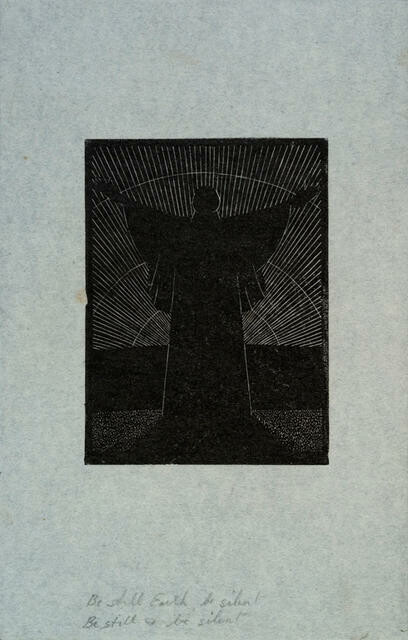Francis A. Shurrock
Aotearoa New Zealand / British, b.1887, d.1977
Be still Earth, be silent, be still and be silent
- c. 1933
- Wood engraving on paper
- Gifted to the Gallery by William E Smith, 2003
- 205 x 130mm
- 2003/133
Tags: Bible stories, Christianity, monochrome, people (agents), religious art, storms, sunbursts, symmetry
The words 'Be still Earth, be silent, be still and be silent' is part of a 1928 translation into English of a song by Franz Schubert (1797-1828).
The translation appeared in the journal 'Music and Letters', Vol. 9, No. 4, (Oct., 1928), pp. 381-385. This issue was a special Schubert issue, to mark the centenary of the composer’s death. As well as articles on Schubert’s life and works, it included translations of songs mentioned. The song in question is 'Auflösung' and it was translated, to be sung, like this:
Veil, sun, thy glory! Fierce the rays of thy fury, They sear me to the bone, And you, ye voices, When the spring rejoices, Away! and let me alone (let me alone). Welling up within, new forces Range and sweep resistless in their courses, Now making melody Now heav'nly harmony; Be still, earth, he silent, for I Would listen To the song of the soul that is free from her prison.
The last part of the song involves various repeats and there is a specific instruction for it to be sung thus:
Be still, earth, be silent; be still and be silent; for I would listen to the song of the soul that is free, that is free from her prison is free from her prison. Be still, earth, be silent, be silent.
This is a very free translation, designed to be sung. A more modern translation, not suitable for singing, from the Hyperion Schubert Edition:
Hide yourself, sun, for the fires of rapture burn through my whole being. Be silent, sounds; spring beauty, flee, and let me be alone! From every recess of my soul gentle powers well up and envelop me with celestial song. Dissolve, world, and never more disturb the sweet ethereal choirs.
And the original German, a poem by Johann Mayrhofer (1787-1836)
Verbirg dich, Sonne, Denn die Gluten der Wonne Versengen mein Gebein; Verstummet, Töne, Frühlings Schöne Flüchte dich und lass mich allein! Quillen doch aus allen Falten Meiner Seele liebliche Gewalten, Die mich umschlingen, Himmlisch singen. Geh unter, Welt, und störe Nimmer die süssen, ätherischen Chöre.
Wood engraving experienced a revival in Britain during the 1920s and 1930s. However, few artists employed the medium in New Zealand at the time. It is one of the most difficult of print mediums to master, but it is obvious from this work that Francis Shurrock successfully adapted to the challenges of the medium.
The religious nature of this work, along with the simple, stylised art deco design and use of line, shows the influence of Britain’s most successful wood engraver, Eric Gilll
Born in England, Shurrock received a Royal Exhibition Scholarship in 1909, which enabled him to study at the Royal College of Art in London. He came to New Zealand in 1923 to teach at the Canterbury College School of Art, a position he held until 1948. Shurrock exhibited with the Canterbury Society of Arts and served on the Society’s council. He also exhibited with The Group in Christchurch and with the Royal Academy in London. After his retirement he worked on private sculptural projects.
